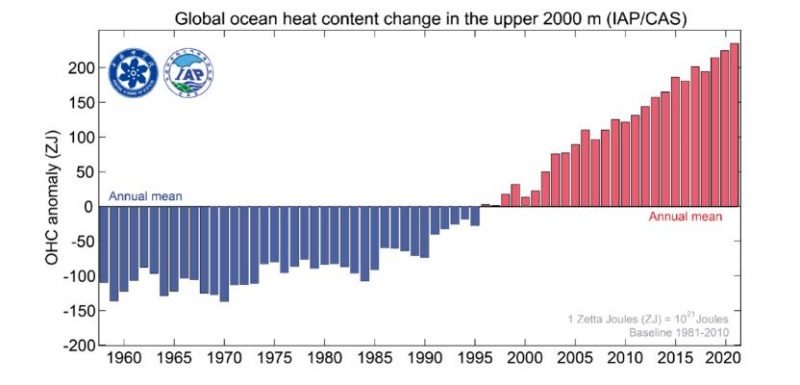[ad_1]
The earth broke another heat record last year.
For the sixth year in a row, the joint research of engineering professor John Abraham of the University of St. Thomas and 23 scientists from around the world discovered that, by their measurements, the world’s oceans are hotter than ever.
“The earth is warming and people are to blame”, said Abraham.
“The heating will continue indefinitely until we take collective action to reduce greenhouse gas emissions.”
Earth’s temperature is dictated by ocean temperatures. How much the world’s oceans warmed up in 2021 compared to a year ago is beyond what most can imagine.
“The oceans absorb as much heat as 7 atomic bombs that explode every second 24 hours a day, 365 days a year.“, He said.
Scientifically, the data show that the oceans warmed by about 14 zetajoules.
A zetajoul is 1,000,000,000,000,000,000,000 joules of energy. In 2021, researchers found that the 2000 meters above the world’s oceans absorbed 14 Zetajoules more than in 2020, equivalent to 145 times the world’s electricity generation.
For context, all the energy people use around the world in a single year is about half a Zettajoule.
Researchers measure the oceans because they are absorbing the vast majority of the heat associated with global warming. In fact, more than 90% of global warming heat ends up in the oceans.
“I like to say that global warming is really the warming of the oceanSaid Abraham.
“If you want to know how fast climate change is happening, the answer is in the oceans.”
The oceans are absorbing most of the heat from carbon emissions. The researchers found, however, that temperatures are not rising uniformly across the planet. They found that the fastest warming is in the Atlantic, Indian Ocean and North Pacific.
“Using climate model simulations, we directly link different ocean characteristics to human emissions of industrial pollution and greenhouse gases.” tha Abraham.

Ocean heat, from 1958 to 2020.
The largest source of greenhouse gas emissions from human activities in the United States is from the burning of fossil fuels for electricity, heating, and transportation, according to the U.S. Environmental Protection Agency.
University plan St. Thomas involves the removal from public securities of any company whose main business is the exploration or extraction of fossil fuels such as coal, oil and natural gas. It will also move away from similar investments of private companies in the next 10 years, making no new investments in fossil fuel companies.
Abraham said he is proud to work at a university that “embraces the clear science of climate change and the obligation to work towards solutions, from reducing emissions on campus to training students to be the force of change in the future.”
While climate change is certainly a problem, there are also tremendous opportunities to create high-paying jobs in the clean energy sector, he said.
“The world’s future economies will be built on clean energy technology. “St. Thomas is playing an important role in positioning our students and our nation to lead in this space.”
For individuals, solutions to reduce our carbon footprint are as simple as turning off the lights when leaving a room, traveling by bus or bicycle, or driving an electric vehicle.
“My New Year’s resolution is to help the planet cool down, it is getting hot here and there is no sign that things will change any time soon. “Collectively, we certainly have the technology to reduce greenhouse gases, but we have never really shown the will.” tha Abraham.
top channel
[ad_2]
Source link















